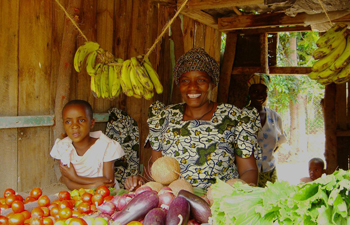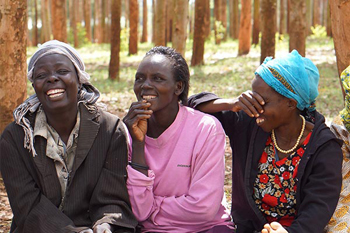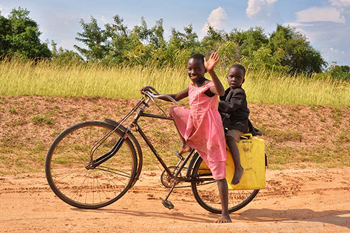Dianne Calvi has been the President and CEO of Village Enterprise since 2010. Dianne received a BA from Stanford University and an MBA from Bocconi University (Milan, Italy) on a Rotary Ambassadorial Scholarship.
Dan Clendenin: Welcome to "Conversations" with Journey with Jesus.
Dianne Calvi: Thank you.
Muhammad Yunus, founder of the Grameen Bank in Bangladesh and recipient of the 2006 Nobel Peace Prize, once wrote, "No one who cares about humanity is satisfied with a world in which a few hundred million people enjoy access to all the resources of the planet, while billions more struggle to survive."
While I agree in theory with Yunus, in reality, most people are too far removed from the problem of poverty. It's a problem that seems very remote to the few hundred million who enjoy access to all the resources. We need to increase awareness and to bring the problem closer to home so that people who care about humanity can do something about the problem and understand why it's important.
 |
Although some poor countries have experienced significant economic growth in the last several decades (Brazil, China, India), "extreme poverty" remains a huge problem — the so-called "bottom billion."
That’s very true. "According to latest World Bank estimates, the share of Africans who are poor fell from 56% in 1990 to 43% in 2012. The report argues that the poverty rate may have declined even more if the quality and comparability of the underlying data are taken into consideration. However, because of population growth, many more people are poor, the report says. The most optimistic scenario shows about 330 million poor in 2012, up from about 280 million in 1990. Poverty reduction has been slowest in fragile countries, the report notes, and rural areas remain much poorer, although the urban-rural gap has narrowed.”
The Oxford economist Paul Collier identifies about sixty countries that are not merely "falling behind, they are falling apart." About 70% of these countries are in Africa, and they are poorer today than they were in 1970. "Picture this," writes Collier, "a billion people stuck in a train that is slowly rolling backward downhill."
Extreme poverty is still one of the greatest problems facing the world today. While there are encouraging trends in worldwide poverty (mostly due to the decrease in poverty in China and some of its neighboring countries), the fact remains that extreme poverty in absolute numbers is increasing in Sub Saharan Africa because of population growth, inadequate rules of law, lack of access to capital and markets, just to name a few of the problems.
But we don't have to remain bystanders: "Our support for change can be decisive," says Collier. And that's where Village Enterprise comes in. You work with the extreme poor in rural Africa, right?
Right. Village Enterprise works with the ultra poor in rural Africa to build sustainable savings and incomes. Local business mentors employed by Village Enterprise use a community driven process to target the ultra-poor and provide them with seed capital in the form of a grant, business and financial literacy training, and mentoring to start small, sustainable businesses and savings groups.
Why grants and not loans? Shouldn't people pay back that money?! Doesn't it create dependence, or attract people who just want your money?
There's a growing body of evidence that micro-loans do not lift the extremely poor out of poverty. People living in extreme poverty in rural communities need more than a loan; they need training, mentoring, and an opportunity to save and to get the business off the ground without worrying about paying off the loan (that often comes with high interest rates).
What percentage of your grants go to women?
Over 80%.
VE also partners with the Jane Goodall Institute to protect the environment.
Yes, we began a partnership with the Jane Goodall Institute in 2007 to bring our Graduation model to the Budungo Forest, a critical chimpanzee habitat in western Uganda. Providing local families with the tools and resources to start sustainable businesses keeps them from hunting and exploiting forest resources. Since then, Village Enterprise has adopted this strategy regionally to extend to a wide band of protected areas and corridors, including southwest Budongo Forest villages and the Hoima District community forests in Uganda. In 2012, we introduced the model in Kenyan villages surrounding the Kakamega Forest, in partnership with Kenya Wildlife Services. Due to the success of these programs, Village Enterprise now includes a sustainability curriculum in all our areas of operations. By supplementing business training with conservation training, we are helping local people make a living without exploiting natural resources. Through our integrated training, we are achieving the dual benefits of tackling poverty and protecting animals and forests.
VE has been around a while. Founded in 1987, you'll celebrate 30 years in 2017.
Yes, Village Enterprise was founded in 1987 by Brian Lehnen and Joan Hestenes, who were motivated by their Christian faith to help the poor start micro-businesses. Since that time, we have started over 36,000 businesses, trained over 125,000 new business owners, and lifted over 700,000 people out of extreme poverty.
Count me in on your 30th-anniversary celebration!
Asante sana! (Thank you!).
How have your vision and strategy evolved across three decades?
Our vision remains the same: to end extreme poverty. Our strategy has changed in that we have started to train others to implement our proven model so that we can scale more rapidly and innovate to increase our impact.
Thirty years is also long enough to reflect on successes and failures. Can you talk about those? What has VE learned in 30 years?
That’s a big question! We are always learning, each and every day. We have learned that there is no simple solution to extreme poverty and that we have to listen closely to the communities in which we work. We celebrate our successes — the many people who are now self-sufficient — but we continue to learn from our mistakes.
 |
Micro-enterprise used to be criticized for the lack of empirical data about real results, but in recent years this canard has been addressed head on, right?
Yes, there's a growing body of evidence from many different randomized controlled trials that have been conducted in countries around the world that has shed light on the success of the micro-enterprise, integrated graduation approach that we have been implementing.
I'm thinking of the work of Esther Duflo, the co-founder of MIT's Poverty Action Lab. They've conducted over 200 empirical development experiments and train development practitioners in running randomized controlled trials — the gold standard in clinical medicine.
Yes, Esther Duflo of MIT’s economics department and Director at the Abdul Latif Jameel Poverty Action Lab (J-PAL) states: “The Graduation approach has led to broad improvements in key dimensions of economic and non-economic well-being in most countries where it was tested. Policymakers seeking a program to sustainably improve the lives of the very poor should consider investing in this approach.”
Another question is whether micro-enterprise can address macro-systemic problems like bad governance, corruption, civil wars, environmental degradation, and a global population that could reach 10 billion by the year 2050. But maybe that's not its mission.
There's no single intervention that can address all of the problems in the world; however, by lifting the very poor out of extreme poverty you have a positive impact on many of the macro-systemic problems. People who are no longer extremely poor are more likely to have smaller families and less likely to resort to violence. Also, by empowering the ultra-poor, especially women, and providing them with information about the importance of protecting their environment, you can have a positive impact on the civil society and the environment as well.
In his autobiography Banker to the Poor (1999), Yunus says that he came to "dread" giving lectures that were so far removed from the everyday lives of normal people. He abandoned book learning in favor of listening to and learning directly from the extreme poor.
I can relate to Yunus.
Why do we rich westerners always see ourselves as the benefactors and the poor as the beneficiaries? Yunus flips this script.
I think that it's human nature. Yunus also has tremendous faith in the initiative, skill, resilience and creativity of the poor.
I experienced this when I went to Kenya and Uganda with VE in 2004. I still remember some of the micro-businesses we visited: a seamstress, a bike repair shop, a school bakery.
I believe that the poor are no different from you and me. As Professor Chivaka, a Stanford visiting professor from Cape Town University once said to me, “Poverty is not caused by lack of money; poverty causes families to not have money. Poverty is the lack of opportunities that in turn limit access to sustainable wealth-creating assets."
There are also criticisms in development discussions about the big aid agencies. William Easterly calls it the "Planner" mentality. "Planners" pursue utopian objectives, design global blueprints, and implement them with little local knowledge and little feedback from the intended beneficiaries.
This is definitely a problem that prevents the international development sector from having its intended impact.
 |
Jeff Sachs, Director of Columbia University's Earth Institute, though, still tries to make the case for more aid channeled through large, multi-national agencies. I think VE also works with NGO's and government agencies?
Village Enterprise works with both larger NGOs and USAID. I agree with Sachs that there is a role for large, multi-national agencies; however, I also believe that the system needs to change so that more of the financial resources go directly to the people who need them most.
Do we need more aid or simply more effective aid? Is more aid the problem or the answer? Or perhaps that's a false dichotomy?
I believe that we need to address the problem of the enormous inequality and inequity in the world.
Mother Teresa once said that only in heaven will we see how much we owe the poor for helping us to love God as we should.
Dianne: Amen.
Thank you, Dianne. Paul Farmer has urged us not merely to "manage" our horrible socio-economic inequalities. He challenges each one of us to make a difference by what he calls "pragmatic solidarity" with the poor. Toward that end, I noticed that your website villageenterprise.org has a drop down menu for "Take Action."
Notes:
Paul Collier, The Bottom Billion; Why the Poorest Countries Are Failing and What Can Be Done About It (Oxford: Oxford University Press, 2007), 205pp.
Paul Collier, The Plundered Planet; Why We Must — and How We Can — Manage Nature for Global Prosperity (New York: Oxford University Press, 2010), 271pp.
Judith M. Dean, Julie Schaffner, and Stephen L.S. Smith, editors, Attacking Poverty in the Developing World; Christian Practitioners and Academics in Collaboration (Waynesboro, GA: Authentic Media, 2005), 286pp.
William Easterly, The White Man’s Burden: Why the West’s Efforts to Aid the Rest Have Done So Much Ill and So Little Good (New York: The Penguin Press, 2006), 448pp.
Paul Farmer, Pathologies of Power; Health, Human Rights, and the New War on the Poor (Berkeley: University of California Press, 2003), 402pp.
Ian Parker, "The Poverty Lab: Transforming Development Economics, One Experiment at a Time," The New Yorker (May 17, 2010). An overview of Esther Duflo's work.
Jeffrey D. Sachs, Common Wealth; Economics for a Crowded Planet (New York: Penguin Press, 2008), 386pp.
Jeffrey Sachs, The End of Poverty; Economic Possibilities for Our Time (New York: Penguin, 2005), 396pp. With a foreword by Bono.
Muhammad Yunus, Banker to the Poor; Micro-Lending and the Battle Against World Poverty (New York: Public Affairs, 1999, 2003), 273pp.
Muhammad Yunus, Creating a World Without Poverty; Social Business and the Future of Capitalism (New York: Public Affairs, 2007), 261pp.
Image credits: (1–3) VillageEnterprise.org.


